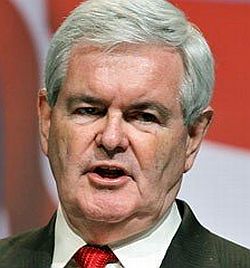Main Street Journal: Online Exclusive: Ed “Doc” Holliday: R-E-W-T, Rewt for Newt!


Online Exclusive: R-E-W-T, Rewt for Newt!
By: Ed “Doc” Holliday
Â
Immediately following the Thursday night debate in Charleston, South Carolina, Newt Gingrich stepped from the candidates’ platform into the roaring crowd and grabbed the enthusiastic hand of Tony Llewellyn. The gray-haired landscaper and dirt mover from Alabama shouted above the noise of the crowd, “I am going to R-E-W-T, Rewt for Newt!” Gingrich smiled and exclaimed to the tea party leader, “I like that!” But Tony was not the only person impressed with Newt’s performance. Going into the debate at Charleston, Gingrich had cut into the substantial lead Mitt Romney had enjoyed for weeks in South Carolina. Gingrich was now polling neck and neck. But after the debate in Charleston his numbers surged and two days later Newt won South Carolina in a landslide. I called Tony, and his nephew had come up with another slogan: “Out with the Obama and in with the Newt!”
Why?
I can tell you why because I was there to witness that milestone in American political history. January 19th was a remarkable day in political intrigue, well before the debate that night in Charleston. In the morning, Rick Santorum was declared the official winner of the Iowa caucuses over Mitt Romney. Texas Governor Rick Perry dropped out of the presidential race. Excerpts of Newt’s second ex-wife’s supposed campaign-killing interview with ABC News were strategically being leaked. The day was filled with suspense from all spectrums of politics. As I walked toward the auditorium I passed by the DNC room and saw its leader, U.S. Representative Debbie Wasserman-Schultz. Media from around the world were converging on the arena. I was attending with the Tea Party Patriots as they were one of the co-sponsors with CNN for the debate.
The previous week I had lamented that the tea party movement was getting very close to not having any influence on choosing the candidate who could best represent conservatives as the Republican presidential candidate. I had studied Newt and had seen him skyrocket before Iowa only to be shot down like a duck in season. I pondered openly on my Internet radio show (Doc Holliday’s Tea Party ) whether Rick Santorum was the last hope to stop Romney from being crowned by the establishment to be the Republican nominee. Many pundits were saying after South Carolina Mitt would be wrapping up the delegates and the nomination. They proudly pointed to South Carolina’s “tea party” governor, Nikki Haley, and her endorsement of Mitt Romney. Evangelical leaders had met just a week earlier and more than a hundred of them from around the country decided to endorse Rick Santorum. The tea party movement seemed lackluster in support for any one candidate.
All these factors led to a charged atmosphere as if positive and negative electrons were straining to be jointly bonded. Like Mick Jagger of the Rolling Stones sang, “I knew she was gonna meet her connection.” All these politically magnetized factors were spinning around as the audience started taking their seats in the auditorium. Ironically, those Jagger lyrics come from the song, “You Can’t Always Get What You Want.” Many in the live audience and many in their homes came into the debate wondering if they would find a presidential candidate they could enthusiastically support.
CNN’s production leader sparked the live audience to cheer as the event went live. Immediately, a stark contrast was seen by the gathered Republicans. In the bleacher seats on the floor, the more establishment Republicans were to the right of the candidates and the rambunctious tea party coordinators from around the country were on the left side. As CNN’s production leader keyed the crowd to cheer, he and everyone in the audience could tell where the Tea Party Patriots were seated. CNN’s moderator for the night, John King, wasted no time by asking Newt, in his first question of the night, about his ex-wife’s marital allegations. A controlled but righteous anger bellowed forth from Gingrich as the live audience cheered Newt on. The tea party leaders enthusiastically stood, shouted, clapped and whistled. They cheered Newt as he slammed not only John King but the entire mainstream media. Throughout the night Gingrich continued to deliver bold, direct, and succinct answers that reached into the hearts and minds of the tea party movement and, as the election proved two day later, many of the undecided voters. These voters were discovering what they needed in a presidential candidate.
A “wow” moment was born. It was as if many in the media were waiting to see if the Gingrich candidacy would implode. The candidate was on his political deathbed once again during this nominating process. Then moderator John King came in like Darth Vader representing all the “Empire’s” mainstream media. The only thing missing was some Darth Vader-themed music. He pushed Newt to the precipice with his planned question as soon as the debate started. The rotund, gray haired historian seemed visually out of his league in this age of glamour media. But Gingrich jumped on the question and called it “despicable.” In a Yoda-like response Newt defended himself, as though he had taken a Star Wars light-saber to fight his way to victory like a Jedi. John King looked light-saber-whipped. Newt’s response was a grand slam home run. He answered in such a way that the media became the bad guys and poor, nerf herder Newt was being bullied by the Dark Side—and he had been. Instead of a distanced Bill Clinton lecturing, “I feel your pain,” Newt connected with the audience in a down-in-the-trenches, unifying way where they shared his pain.
The connection was soul-deep and meaningful in a way that cannot be fully explained. Maybe by looking into our political past we can see a glimpse of what was happening. Chris Matthews, ever the liberal pundit, once explained that Reagan had a connection to the common voter—middle-class, blue collar workers. These voters were famously called Reagan Democrats. Matthews said that he could not explain it but the connection with Reagan was there and it was loyal. And in Charleston, Newt cemented his connection with his audience. The atmosphere in the auditorium was electric. Newt’s jolting answers caused a stirring reaction within the tea party members in the auditorium. That enthusiasm was transferred over the airwaves with galvanizing effect throughout America to hard working, scrappy, middle-class, blue collar Americans who cling to their guns and their Bibles.
That’s why Tony Llewellyn cried out, “I am going to R-E-W-T, Rewt for Newt!” That’s why the next day’s Romney campaign stops were the best political events money could put together but they were firing-up only those who already endorsed him. I attended a Romney rally the day after the debate in Charleston and the crowd was lively, the music was upbeat and loud. Both South Carolina Governor Nikki Haley and Virginia Governor Bob McDonnell showed how much the establishment Republicans wanted Mitt Romney. I even overheard one local person say, “I’ve not seen this much excitement since JFK was running for president.” It made me wonder if this guy was a Republican or a Democrat. Romney seemed to be dutifully crossing his T’s and dotting his political I’s, but his message was clearly not resonating with most of the people in South Carolina.
In my just-released book, Doc Holliday’s Rock Splitting Politics (see sidebar), I devote quite a few pages to the fact that what is happening on the political ground in 2012 can be paralleled to the battlefield of Gettysburg. Now, Newt had a good debate a couple of days earlier in South Carolina and you can alternatively argue that debate may have been his Vicksburg. But there can be no doubt that the debate in Charleston was Gingrich’s Gettysburg moment. Just as the Confederate and Union generals did not plan for the sleepy city of Gettysburg to be the turning point of the American Civil War (Alright, I know that it is really called the War Between the States.) when the fighting broke out it became a do-or-die battle. Charleston could have been like many of the other presidential debates, but the intrigue of events that day led to Gingrich’s galvanizing Gettysburg moment.
With one swift, defiant answer, he became the tea party’s favorite candidate. Why? Because the tea party was looking for a conservative. But more than that they wanted a fighter—someone who would be like Teddy Roosevelt’s “Man in the Arena,” someone who would articulate what it means to win. Newt had just stated that he did not want to bloody Obama’s nose, he wanted to knock him out. Newt came out swinging with his words in the Charleston debate and most of the tea party teamed with Newt that night to restore America. What sticks to the heart is what moves the tea party and Newt’s political bonding is sticking to the hearts of the tea party. What sticks to the heart moves more than just the tea party, it moves Americans who believe that Constitutional principles and the Declaration of Independence still make freedom worth fighting for. The tea party’s new prize fighter is expanding his reach well beyond the tea party’s numbers. Newt is consolidating voters throughout middle-class, blue collar America. His connection to this group is the large base from which candidates win political office.
What seems so disheartening to the media and the establishment is their new, or rather their “Newt,” realization. When they confront these new Newtonians climbing onto Newt’s bandwagon they can recall all Newt’s baggage and tell these new supporters how high his negatives are, to no avail. These new Newtonians will look the pundits in the eye and say, “He ain’t heavy, he’s my brother.” Now I am not saying that the Republican establishment is about to break out into a Republican rendition of the old Hollies hit, because the Empire will strike back. The Republican establishment and the Democratic power players don’t want Newt. Newt now must show that he can continue to be the Jedi fighter that his newly minted connection to working-class, blue collar voters has enabled him to become. He must use his political light-saber to make maximum mincemeat of Obama’s job killing policies, starting immediately.
I cannot tell you how this topsy turvy race for the nomination or the White House will conclude. But I will say that the closer that Newt comes to the nomination—and ultimately the White House—the more historical and significant that debate night in Charleston grows.
I was there, I know.
Â
![[Bloglines]](http://www.mainstreetj.com/wp-content/plugins/bookmarkify/bloglines.png)
![[del.icio.us]](http://www.mainstreetj.com/wp-content/plugins/bookmarkify/delicious.png)
![[Digg]](http://www.mainstreetj.com/wp-content/plugins/bookmarkify/digg.png)
![[Facebook]](http://www.mainstreetj.com/wp-content/plugins/bookmarkify/facebook.png)
![[Google]](http://www.mainstreetj.com/wp-content/plugins/bookmarkify/google.png)
![[MySpace]](http://www.mainstreetj.com/wp-content/plugins/bookmarkify/myspace.png)
![[Shoutwire]](http://www.mainstreetj.com/wp-content/plugins/bookmarkify/shoutwire.png)
![[Squidoo]](http://www.mainstreetj.com/wp-content/plugins/bookmarkify/squidoo.png)
![[Technorati]](http://www.mainstreetj.com/wp-content/plugins/bookmarkify/technorati.png)
![[Twitter]](http://www.mainstreetj.com/wp-content/plugins/bookmarkify/twitter.png)
![[Yahoo!]](http://www.mainstreetj.com/wp-content/plugins/bookmarkify/yahoo.png)
![[Email]](http://www.mainstreetj.com/wp-content/plugins/bookmarkify/email.png)




